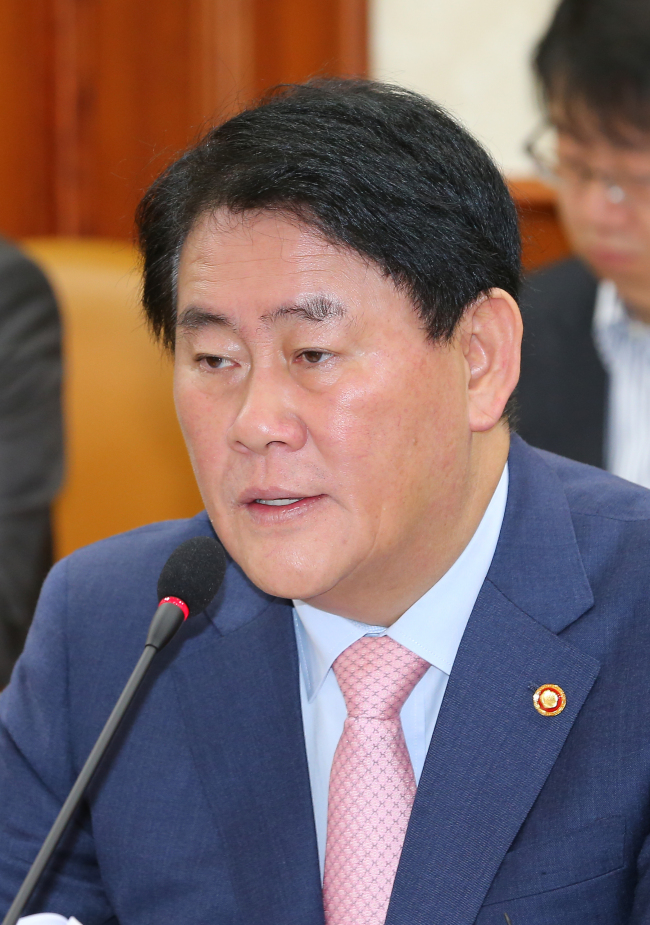As Finance Minister Choi Kyung-hwan marks his first 100 days in office on Thursday, questions are being raised about his economic vision ― dubbed “Choinomics” ― as the nation continues to grapple with rising household debt and the economy showing lackluster performance amid lowered growth forecasts.
Since Choi took office in July, he proposed diverse measures to boost the sluggish economy. They included a 41 trillion won ($40 billion) stimulus package, relaxed mortgage regulations for stimulating the property market, and plans for offering tax breaks to companies that boost dividends and investment.
The main aim of these measures, all part of Choinomics, is to release money into the market to spur the economy, and also to manifest the government’s willingness to play a more active role. To show its support, the Bank of Korea has been cutting the key interest rate.
Since Choi took office in July, he proposed diverse measures to boost the sluggish economy. They included a 41 trillion won ($40 billion) stimulus package, relaxed mortgage regulations for stimulating the property market, and plans for offering tax breaks to companies that boost dividends and investment.
The main aim of these measures, all part of Choinomics, is to release money into the market to spur the economy, and also to manifest the government’s willingness to play a more active role. To show its support, the Bank of Korea has been cutting the key interest rate.

However, questions remain about whether interest rates and real estate ― traditionally two of the most commonly used economic stimulants ― are valid tools for propping up an economy that faces new challenges and risks.
“Stimulating the economy by raising household debt and property prices may have positive, short-term effects. However, this will eventually pose a serious problem for the economy when the bubble bursts,” said Shin Kwan-ho, an economics professor at Korea University.
The nation’s household debt reached 1 quadrillion won ($940 billion) in 2013, and has risen by 11 trillion won since the government began easing mortgage-lending controls in July.
Industry watchers also warned that Choi’s latest policies are more focused on backing large companies instead of ordinary households.
“The government’s policies were devised largely to benefit big companies rather than middle- and low-income groups,” said Kim Jin-bang, an economics professor at Inha University.
As proof, he cited the government’s initiative to offer tax breaks to companies boosting their dividends, as well as its controversial plan to hike tobacco tax and residence taxes.
“The government should focus more on how to improve the general economic structure by raising wages and bolstering domestic consumption to support more middle- and low-income groups,” Kim said.
Pressed to raise enough funds to finance its welfare and economic stimulus measures, the government has been devising diverse ways to milk more taxes.
By Shin Ji-hye (shinjh@heraldcorp.com)











![[Today’s K-pop] BTS pop-up event to come to Seoul](http://res.heraldm.com/phpwas/restmb_idxmake.php?idx=644&simg=/content/image/2024/04/17/20240417050734_0.jpg&u=)





![[KH Explains] Hyundai's full hybrid edge to pay off amid slow transition to pure EVs](http://res.heraldm.com/phpwas/restmb_idxmake.php?idx=652&simg=/content/image/2024/04/18/20240418050645_0.jpg&u=20240418181020)

![[Today’s K-pop] Zico drops snippet of collaboration with Jennie](http://res.heraldm.com/phpwas/restmb_idxmake.php?idx=642&simg=/content/image/2024/04/18/20240418050702_0.jpg&u=)